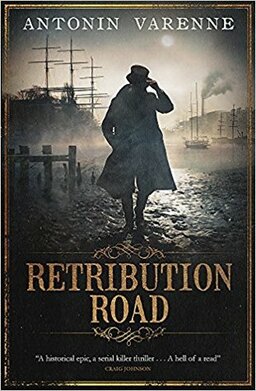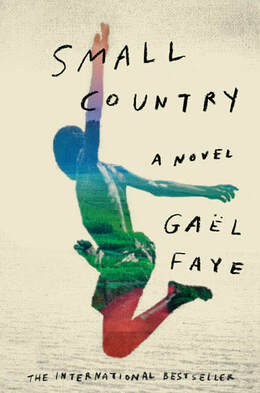Retribution Road by Antonin Varenne translated by
Sam Taylor
Arthur Bowman is one such officer, having returned, mentally and physically scarred, from Burma six years before. A sergeant in the Company’s private army, he was selected for his violence, ability to lead and to follow orders, and sent on a secret, and doomed, mission up the Irrawaddy River. Captured, caged and tortured[1] deep in the forest for almost a year, he emerged, with nine others, like a walking corpse.
When Bowman discovers a body in a London sewer, with multiple incisions across chest and back, he’s deeply disturbed. The victim’s wounds mirroring his own scars, and those of his fellow survivors, he’s convinced one of them must be the killer. But when he passes on this information, not only is there no record of his and his comrades’ capture, he’s branded a murderer himself. As more mutilated bodies are reported, he sets out on a journey in search of the culprit that takes him through central and southern England and across the ocean to New York. From there, he follows the suspects’ scent to a failed utopian settlement near Dallas, via thriving and dying mining settlements and along the Pioneer Trail to Lake Tahoe and on to San Francisco, as Lincoln is elected and the country is torn apart by civil war.
Bowman is depicted as a brute and a racist right from the beginning in South India, and it’s testament to Antonin Varenne’s writing that we can care about him and his quest. While reading, romance and friendship soften him somewhat, it might be his rage at seeing former slaves and Native Americans hanged for another’s crimes that changes him most. But he remains a killer, as well as an extremely traumatised man whose night terrors disturb his own and others’ sleep, although we sense his redemption at the end.
At over 500 tightly-packed pages, this is a long novel to which it’s difficult to do justice in a short review. But there’s plenty to keep you turning those pages, whether your literary interest is mid-nineteenth century global history, adventure, suspense, the psychology of the impact of trauma or the sociopolitics of the symbiotic relationship of commerce and killing. First published in France in 2014, perhaps my first read of 2019 will to prove to be one of my favourites of the year. Thanks to MacLehose Press for my review copy.
[1] If you'd find that disturbing to read, as I would, it might be reassuring to know it's only indirectly described.
Small Country by Gaël Faye translated by Sarah Ardizzone
The blurb paints an idyllic picture of Gabriel’s life before the coup, but that wasn’t how I read it. Differences between his parents have led to his mother moving out of the family home, while his father repeatedly leaves the children alone in the house at night. Racism is rife within the expat community, including his father’s close friend, an older Belgian who he says has taught him all he knows about Africa, referring to his cook as a baboon. He is also becoming to recognise the stark inequalities, and struggles with guilt when going to retrieve his stolen bike from a boy in an undeveloped rural area who will never have the opportunity to ride another. But he does enjoy getting up to mischief with his friends.
When that mischief escalates into arming themselves with grenades, Gabriel wants no part of it and stays at home reading books. But then his mother returns from Rwanda with terrible stories about the demise of his cousins that she no longer has the wit to keep to herself. Vicariously traumatised, Gabriel is drawn back into the gang, becoming complicit in a disturbing retaliatory act.
A prize-winning bestseller when published in 2016 in France, this is certainly an important story but, for me, it didn’t live up to the hype. I found the characters flat, a preponderance of telling over showing, with scenes that seemed to promise tension before fizzling out. I did wake up for the final sixth of the novel (briefly summarised in the previous paragraph), but it felt too little too late. The style might have been intended as subtle (although the occasional philosophising suggests not), or to replicate the impact of trauma, but it read like a story too close to home that the author hadn’t sufficiently processed yet. Thanks to Hogarth Press for my review copy.























 RSS Feed
RSS Feed





















